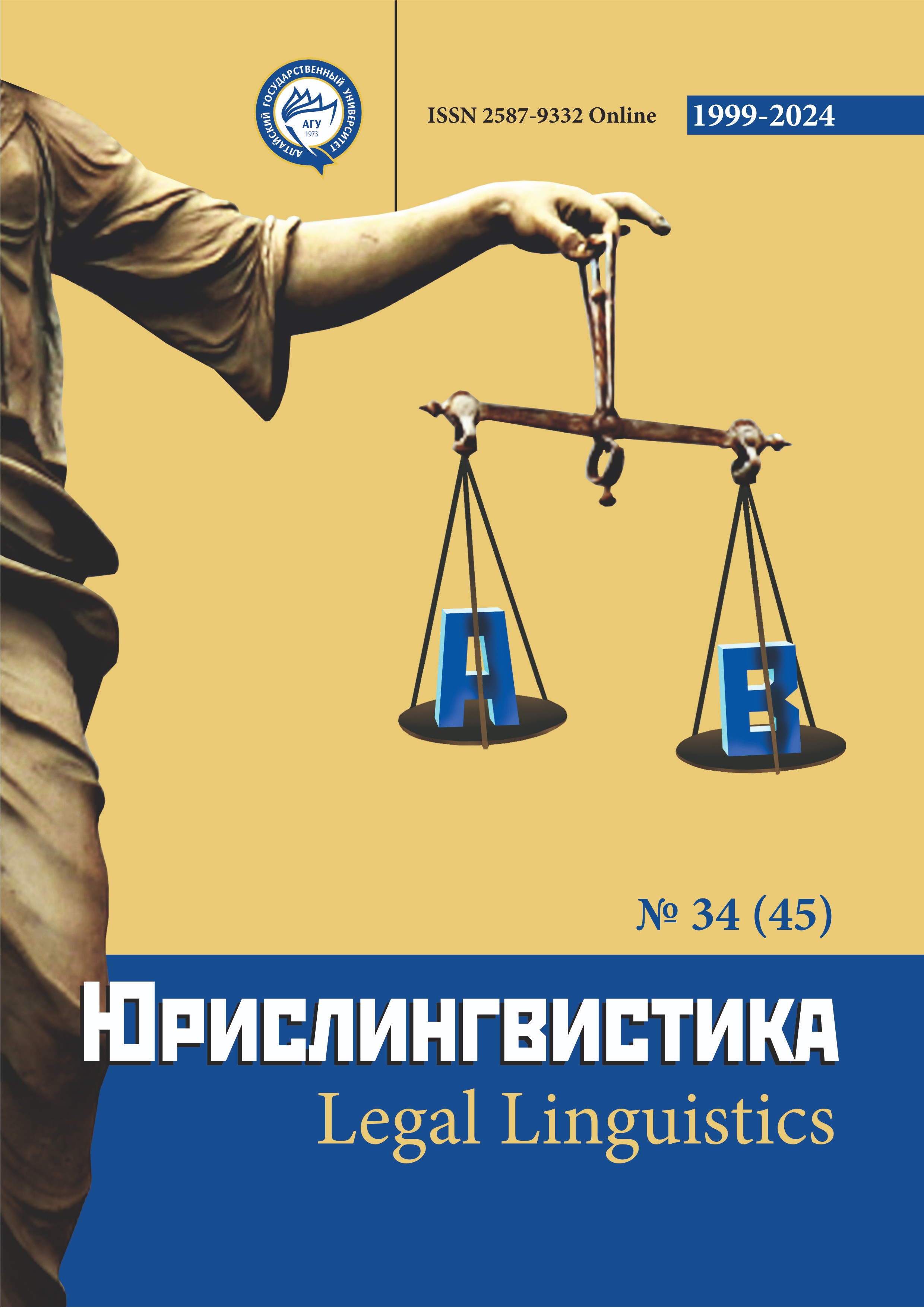The Symbiotic Nature of Destructive Discourse in Respect of Linguistic Expertise
УДК 343.54, ББК 67.408.113
Abstract
The article discusses the nature of destructive discourse in respect of linguistic expertise. Discourse is defined as a text corpus, fragments of which have semantic convergence and intertextual connection, expressed by special pragmatic and semantic markers. It is concluded that the study of controversial texts as elements of a particular discourse must be carried out within the framework of the pragmasemantic paradigm. To do this, the expert must determine the influence of pragmatic factors on the nature of the conveyedmessage, as well as identify lexical and semantic means that were used to implement communicative tasks. The asset of this approach is in taking into account such specific properties of discourse as intentionality, interactionality and social conditioning. It is established that destructiveness is the most important category that defines the pragmatics of discourse. The article defines the content of the category "destructiveness" in the scope of philosophical concepts, considers the factors of destructive behavior from the point of view of physiology and genetics, defines the mental and socio-cultural foundations of destructiveness. In relation to legal linguistics, the author understands destructiveness as a characteristic of discourse, in which the addressee uses conflictogenic speech technologies that provoke the addressee to illegal actions. Accordingly, destructive discourse is a special type of discursive practice, where the subject of speech generation is a delinquent linguistic persona, and the product is a conflictogenic text corpus, the content of which has signs of illegality. Destructive discourse has a symbiotic nature and is implemented within the framework of religious, ethnic, racial, political and other discourses. When studying controversial texts of various types of discourse, experts primarily identify statements containing offensive nominations and public calls for violent actions against representatives of other races, ethnic groups, faiths, as well as markers of propaganda of exclusivity, superiority or inferiority of citizens on one or another basis.
Downloads
Metrics
References
Арутюнова Н. Д. Типы языковых значений: Оценка. Событие. Факт. М., 1998.
Батыршина А. Р. Агрессия с точки зрения нейрофизиологии поведения / Научно-практический журнал «Гуманизация образования». - 2022. - № 4. - С. 97-103.
Богдан С. С. Человеческая деструктивность как социокультурный феномен / Известия Российского государственного педагогического университета им. А. И. Герцена. - 2010. - № 124. - С. 310-320.
Волкова Я. А. Деструктивное общение в когнитивно-дискурсивном аспекте: монография. Волгоград, 2014.
Волкова Я. А. Деструктивность в политическом дискурсе / Russian Journal of Linguistics. - 2016. - № 4. - С. 161-178.
Золян С. Т. Семиотика и прагмасемантика политического дискурса / Политическая наука. - 2016. - № 3. - C. 47-75.
Кубрякова Е. С. Язык и знание: На пути получения знаний о языке: Части речи с когнитивной точки зрения. Роль языка в познании мира. М., 2004.
Кузнецов Н. С. Человек: потребности и ценности. Закончится ли спор Иисуса Христа с Великим Инквизитором?
Свердловск, 1992.
Лысак И. В. Человек-разрушитель: деструктивная деятельность человека как социокультурный феномен. Таганрог, 1999.
Мишланов В. А., Салимовский В. А. Современный церковно-религиозный дискурс в аспекте проблем судебной лингвистики / Вестник Пермского университета. - 2015. - № 2 (30). - С. 84-96.
Немчинова А. Л. Понятие человеческой деструктивности: сущность метафизического подхода / Нефтегазовые технологии и экологическая безопасность. - 2005. - № 5. - С. 17-26.
Ракачёва Я. В. Против кого дружим? Этнический дискурс в кубанской прессе / Человек. Сообщество. Управление. - 2004. - № 1. - С. 104-118.
Тард Г. Преступник и преступление. Сравнительная преступность. Преступления толпы. М., 2010.
Фромм Э. Анатомия человеческой деструктивности. М., 1994.
Шнирельман В. А. Расизм: вчера и сегодня / Pro et contra. - 2005. - № 2 (9). - С. 41-65.
Copyright (c) 2024 Александр Дединкин

This work is licensed under a Creative Commons Attribution 4.0 International License.
The authors, which are published in this journal, agree to the following conditions:
1. Authors retain the copyright to the work and transfer to the journal the right of the first publication along with the work, at the same time licensing it under the terms of the Creative Commons Attribution License, which allows others to distribute this work with the obligatory indication of the authorship of this work and a link to the original publication in this journal .
2. The authors retain the right to enter into separate, additional contractual agreements for the non-exclusive distribution of the version of the work published by this journal (for example, to place it in the university depository or to publish it in a book), with reference to the original publication in this journal.
3. Authors are allowed to post their work on the Internet (for example, in a university repository or on their personal website) before and during the review process of this journal, as this may lead to a productive discussion, as well as more links to this published work (See The Effect of Open Access).











